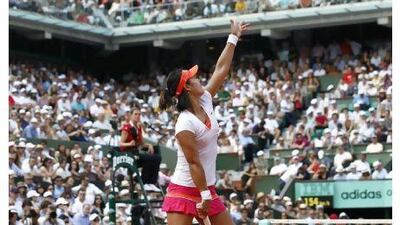When Li Na beat Francesca Schiavone to win the French Open title, she did more than win a tennis match. She hit the jackpot.
The success of the tennis star, who is famous for her tattoos, has sparked a huge burst in popularity for the sport. It is also likely to give the already booming sponsorship business in China a further shot in the arm.
Before her success in Paris this month, the Chinese sports sponsorship market was worth about US$2 billion (Dh7.34bn) annually.
But that is set to climb much higher now the industry has found a Chinese star of her status, and gender, to sell products ranging from tennis balls to ballroom gowns.
So far, her name is used to sell Nike products, Rolex watches and Haagen-Dazs ice cream as well as more specifically sports-related items, but this is only the beginning.
About 116 million people watched her victory in the Roland Garros stadium, a record for a tennis match that is up there with the opening ceremony of the Beijing Olympic Games in 2008, while more than 2 million people are estimated to follow her exploits on Weibo, China's equivalent of the banned social network Twitter.
"This victory will have a massive impact of both the sports of tennis and Li Na's personal value. In effect, overnight she has become the China tennis equivalent of the Chinese basketball star Yao Ming," says Mark Thomas, who runs the sports marketing group S2M in Shanghai.
"I think it's safe to say she's already way bigger than Michael Chang [who won the 1989 French Open]. She is a true national hero," says Mr Thomas.
"For me every major victory on the international stage by a China athlete will have some positive impact on the sports marketing industry in China. I think, though, Li Na's victory will have a much more specific profound effect of the game of tennis here.
"This will be manifested in all aspects of the sport from grass roots participation through to increased television viewing figures and sponsorship revenue in the sport."
Crucially, there are Chinese sports stars emerging in areas that are highly lucrative in sponsorship terms, such as tennis or snooker or golf, rather than in the sports where the country traditionally thrives but which have a lower international profile, such as table tennis, diving or gymnastics.
"China needs sport stars, and companies here want to get into the international market through endorsing those sports stars with global influence," says a spokesman for a group called Competition Management Company of China Sports.
"The growth and expansion of sport sponsorship, especially in these new sports … in China, will be dramatic in future years, and it has already grown a lot," says the spokesman.
Chinese companies are already heavily involved. China Yingli Green Energy Holding announced this month it would become an official sponsor of the 2014 Fifa World Cup in Brazil.
The Anta sports product company has a deal with the Serbian tennis star Jelena Jankovic and is spending $65 million on a four-year sponsorship agreement with the Chinese Olympic Committee to provide equipment for 11 major events, including the 2012 Olympics in London.
But the undisputed champion of sports sponsorship in China has been Lenovo, which is the only Chinese company among the major sponsors of the Olympics, although the high point for the company was the 2008 Games in Beijing.
Since then, Lenovo has been replaced by the Acer computer group, which is based in Taiwan, as a major sponsor for the London Olympics.
As for the state-sponsored field, the main player is the Li Ning Company run by the former Olympic gymnast Li Ning, which had revenues of $1.47bn last year. The company sponsors China's national teams in table tennis, badminton, gymnastics, shooting and diving.
Li Ning is also looking abroad and has deals with the national basketball teams of Argentina and Spain, and the Primera Liga club Espanyol.
The growth of sports sponsorship will also boost the earnings power of the country's top stars.
Li Na, meanwhile, is estimated to be second only to Yao Ming in earnings.
Her success is generating a powerful retail buzz, but then the personal story of Li Na, who will be 30 in February, is also a major selling point.
She won the French Open after a career plagued with injuries and personal problems - among them firing her coach who is also her husband.

